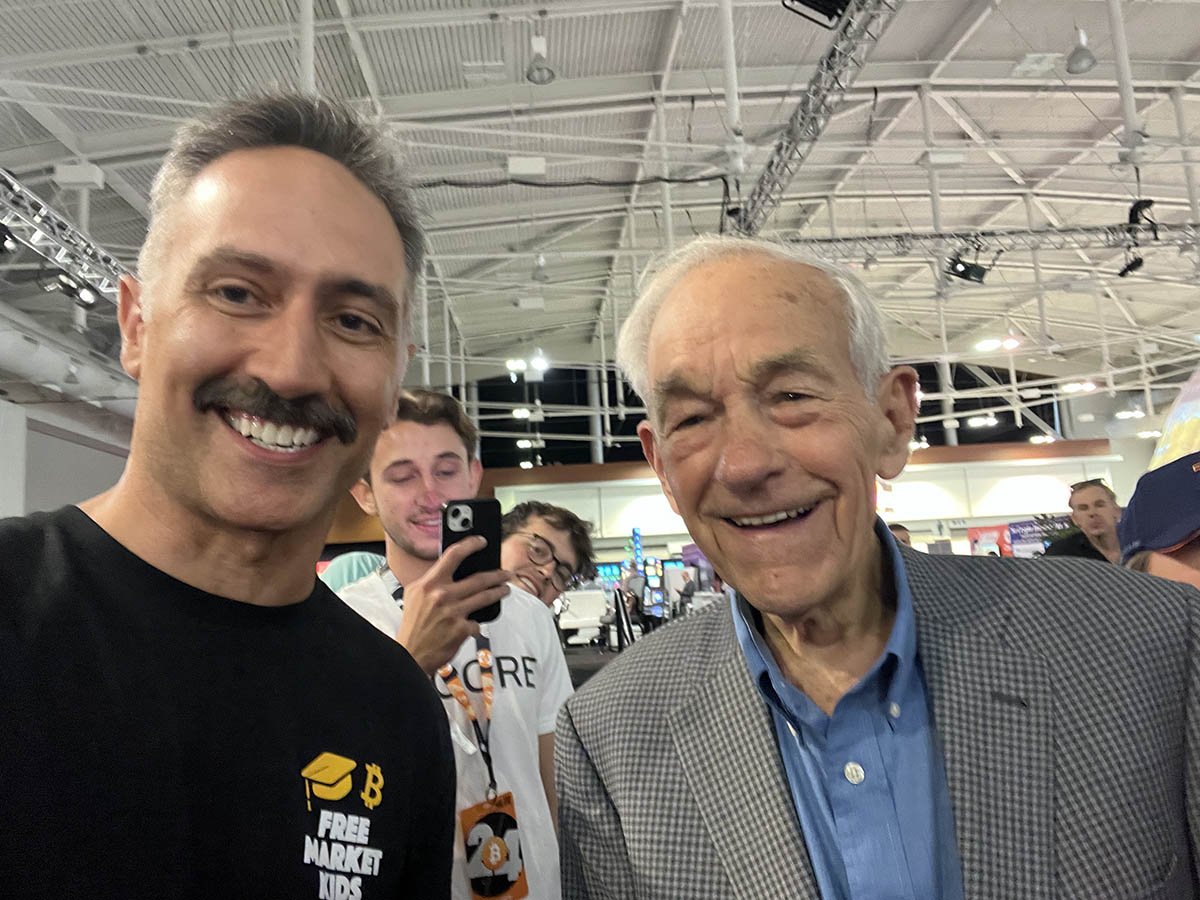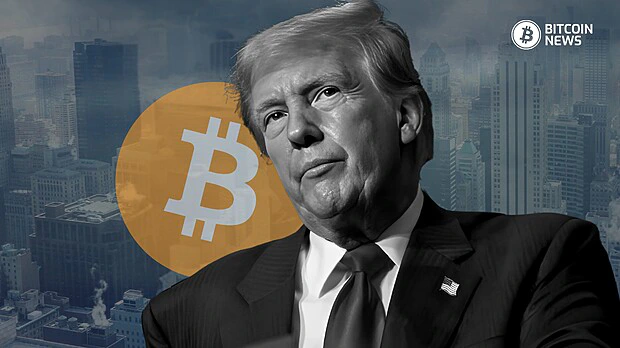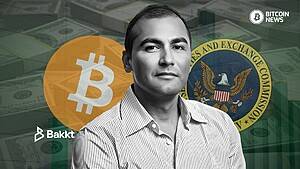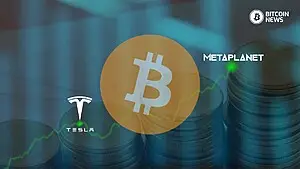As a self-custody HODLer since 2013 who never before attended a formal Bitcoin event, I was excited to spend three days in Nashville meeting a whole convention center full of Bitcoiners from different backgrounds and perspectives.
In the meantime, I was learning as much as I could about the latest tech and real world applications. Many attendees were quick to note that this event had a decidedly different vibe because of the number of high-profile politicians speaking.
I did my best to avoid them. Having spent six years of my 20s working in Congress, I saw how the sausage is made and I wasn’t interested in wasting time listening to a bunch of vague nonsensical double speak from marginally talented, glorified actors trying to jack their poll numbers.
(*Full disclosure: I did shake hands with one of the handful of politicians I actually like thanks to a surprise appearance by Dr. Ron Paul.)

So while the pols spoke on the main stage, I was either attending various presentations, visiting different company booths, or helping the fine folks at Free Market Kids show off their Bitcoin board games.
It was the right move. Several folks who watched the speeches told me that aside from Robert Kennedy’s (ridiculous) promise to have the U.S. government buy 4 million BTC, the political talking heads said little of any real value.
By avoiding those speakers, I was able to take full advantage of my time at the Conference and returned home satisfied with my experience.
About a week after the Conference, I found myself with some time on my hands so I decided to go down the Bitcoin Magazine YouTube rabbit hole and watch some videos of speakers/interviews I had missed.
And yes that eventually included a couple of politicians – specifically two separate interviews with two Democrat Congressmen on the main stage, Ro Khanna of California and Wiley Nickel of North Carolina.
It’s no secret that most passionate Bitcoiners seem to lean libertarian (like myself) or outright to the political right (no shortage of MAGA hats in the convention hall) and I was curious to see what these two Democrats would say to a room full of people who were probably not their usual audience.
Khanna talked about how useful Bitcoin can be to benefit the poor and powerless, how he’d prefer to see a less burdensome, clearer regulatory environment for Bitcoin here in America, and how he’s trying to get his fellow Democrats to see those benefits.
All great to hear. But the more interesting moment I thought came from Nickel (whose interview seems to have curiously been removed from the Bitcoin Magazine channel and is nowhere to be found).
He was respectfully received at first with some tepid applause when he talked about his support for Bitcoin and his efforts to try to get both the DNC and the Democratic presidential ticket to adopt more Bitcoin-friendly policies.
But the crowd quickly turned when he read (or at least tried to fully read in between boos) this quote that Donald Trump tweeted in 2019.
He said: “I am not a fan of Bitcoin and the other cryptocurrencies which are not money, and whose value is highly volatile and based on thin air. Unregulated Crypto Assets can facilitate unlawful behavior, including drug trade and other illegal activity.”
As the booing intensified, Nickel then added that in 2021, Trump called it a scam. He finished his point by saying:
“Folks, I can tell you one thing and I want to say this as politely and respectfully as I can: Donald Trump was President for four years, he did nothing on this issue, and right now I can tell you he’s totally full of shit.”
Well… Nickel is right. And if you’re a Bitcoin supporter, you should be able to admit that.
And to the credit of many in Nashville who watched Trump’s speech, there was a lot of talk that Trump seemed to offer little more than surface level fluff and that it was fair to question whether the man actually understands Bitcoin at all.
Now if you’re reading this and ready to pounce by insisting that Trump is better for Bitcoin than Harris, well, you’re probably right. I’m no Democrat and I won’t be voting for Harris/Walz.
Democrats generally don’t have a strong record of leaving markets alone and neither Harris nor Walz seem to be an exception to that rule. But that doesn’t mean we have to pretend Trump didn’t say what he did. It doesn’t mean we have to get angry at the truth.
The reaction of boos from Nickel reading actual Trump anti-Bitcoin quotes begs the question what are we trying to do here? Should Bitcoin be viewed as yet another in a series of endless tools for partisan political gamesmanship?
Is trying to elect Team Red the most important issue at hand? Is it so important that its worth trying to alienate people who are open to Bitcoin and may even strongly support it but who happen to otherwise lean left or vote Democrat?
Is defending Trump more important than supporting Bitcoin in the clearest, most transparent, most non-partisan way possible?
For a vocal chunk of the crowd, the answer to all of those questions seemed to be yes. And I doubt that anything I write (or most anybody else says) is going to change that.
Supporting Trump was clearly the top/first priority for some people at that Conference. But maybe that doesn’t matter. Maybe all of these are irrelevant questions.
Maybe Bitcoin is just going to do what Bitcoin does and everything else is just theater. And if that’s the case, why am I even bothering to write this… and probably making some enemies in the process?
While I don’t believe that Bitcoin promises a future beyond politics, I do believe it can lessen the influence and importance of politics in our lives – something I think most old school Bitcoiners would love to see. I certainly would.
And for those of us who want to see that future come sooner (for ourselves and our children), it sure doesn’t seem helpful to push away a large segment of people who might otherwise be open to joining us on that journey.
Heck, even if you’re just a single-issue “price go up” kind of person, having more people on board is going to push that price faster and higher. So even if only for base self-interest and nothing more, it’s probably worth trying to leave Bitcoin as a tool for all instead of a tool to score political points.
Of course, nothing that I wrote here means that you shouldn’t support your favored politician (or oppose your disfavored one). None of it means that politics has no influence on Bitcoin and that trying to elect those who support it would probably be a good thing.
Though I think I’ve been around long enough to appreciate that the way elections influence Bitcoin probably won’t be as cut and dry as we all assume.
As we say in Bitcoin, it’s still early. The overwhelming majority of people have no exposure to Bitcoin.
And while some non-Bitcoiners who I personally know have unfortunately come to associate Bitcoin with “crypto-bro” types, the overwhelming majority still more or less cautiously view it as a vague curiosity with no visceral political association.
For many, it’s still largely a blank slate. And I think it would be helpful if we could do our best to keep it from becoming yet another in a long line of quickly-cheapened weapons for the never-ending Red Team vs. Blue Team political games.
Please continue to stay involved in politics (or not) in whatever way you like.
I just humbly ask that we all try our best to leave cheap Red Team/Blue Team politics at the door when it comes to Bitcoin and instead do our best to help our friends, our family members, our neighbors, and even total strangers from all walks of life understand that Bitcoin is for everyone.











